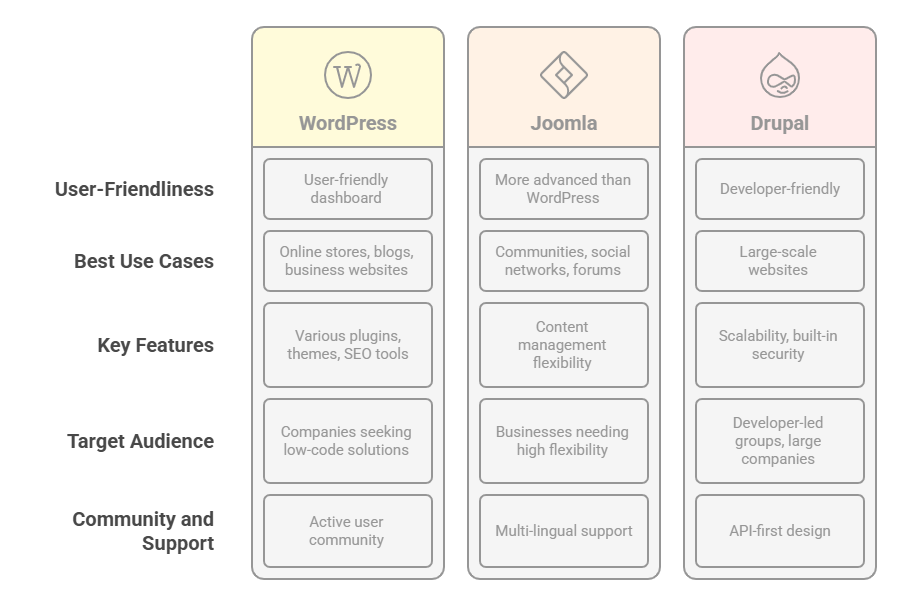Content Management System (CMS) is essential for the modern web, providing tools for users to easily create, manage, and publish digital content. Instead, it handles without the need for advanced programming skills.
Understanding Content Management System
As websites become a crucial part of business, choosing the right CMS is very important. Whether you are running a business website, blog, or e-commerce store, a CMS streamlines the website creation procedure. Therefore, CMS helps businesses to:
- Customize designs using templates and themes
- Publish and handle digital information
- Extension of features using plugins.
Some of the popular CMS alternatives including WordPress, Joomla, and Drupal have their strengths and weaknesses. Besides, selecting the right CMS depends on the company’s needs.
Why Use a Content Management System for Your Website?
Over 40% of all websites worldwide will be powered by WordPress, while Joomla and Drupal will occupy small but significant shares. However, they share similar goals like publishing content, but they differ in terms of their architecture, complexity, usability, and use cases. A CMS is helpful to bring efficiency, flexibility, and scalability. To illustrate, here are some reasons why developers and businesses depend on content management systems.
- Multiple user roles
- Benefits from built-in SEO tools for search rankings
- Quickly update content without coding knowledge
- Using a template for quick website deployment
- Backed by regular updates and the best community support.
WordPress
WordPress is behind almost 40% of websites across the internet, known as a popular content management system, to build multiple websites.
Key features
- User-friendly dashboard for new beginners
- Access to various premium plugins, templates, and themes
- Robust SEO functionalities with plugins like Yoast SEO
- Works for online stores, blogs, and business websites using WooCommerce
- Active user community and developer network
Companies looking for low-code, user-friendly, and best CMS alternatives could opt for WordPress. One major drawback is the need for regular updates to maintain security.
Joomla
Joomla provides a good balance of WordPress simplicity and the difficulty of Drupal. Moreover, it offers the best functionalities for user-based websites.
Key features
- Highly advanced than WordPress
- Excellent for building communities, social networks, and forums
- Offers content management flexibility
- Delivers multi-lingual support
- Advanced content structuring alternative
Indeed, this platform is best for developers or businesses who need high flexibility and user control.
Drupal
Drupal is especially built for powerful users as it provides customization abilities and company-wide security making it useful for complex projects. Moreover, the tool is designed for individuals and offers dedicated facilities in accordance with content types, taxonomies, and APIs.
Key features
- Developer-friendly offering API first design
- Best content architecture and taxonomy
- Scalability and Built-in security trusted by large enterprises and government
- Manages large-scale websites with simplicity
Finally, Drupal is an effective tool for developer-led groups and large companies.
Content Management System Platforms Comparison

Feature Comparison in the Content Management System
1. Usability
WordPress is the most widely used CMS due to its internal dashboard, visual editor, and one-click installation. Joomla offers nominal usage with some drag-and-drop features, whereas Drupal supports developers and technical administrators.
2. Flexibility and Customization
Drupal provides excellent performance through its modular structure. Joomla supports modern customization with manageable practices, while WordPress relies heavily on third-party plugins.
3. Security
Security-first design of Drupal, which is primarily supported by discipline monitoring and an active security team. Joomla provides a comparable level of security but relies on user configuration. WordPress requires proactive maintenance and secure hosting.
4. Community and Support
WordPress has a great community and resource base in the world, which includes meetings, curricula, and commercial support. Joomla and Drupal also maintain vibrant communities; however, their size is smaller, and their technical depth is greater.
5. Performance and Scalability
Drupal is particularly skilled at improving performance and scalability, especially for high-traffic, data-intensive websites. Joomla provides good performance for complex websites, while WordPress may require optimization plugins to efficiently handle high loads.
Want to start building your website today with the best Content Management System?
From custom web development and creative web design services to enhanced digital marketing services, website software services assist you in growing your business online. We specialize in building websites for businesses with e-commerce websites. If you want to start building your website then choose the right CMS, whether it is Joomla or WordPress to create an easy and manageable website. Take the first step to bring your online presence with our services.
Keywords
Content, Management, System, CMS, Drupal, WordPress, Joomla
Relevant Articles
Static Website Design vs Dynamic Website: Which One Is Right for Your Business?
Read More about the Topic
Joomla, Drupal and WordPress – a statistical comparison of open source CMS